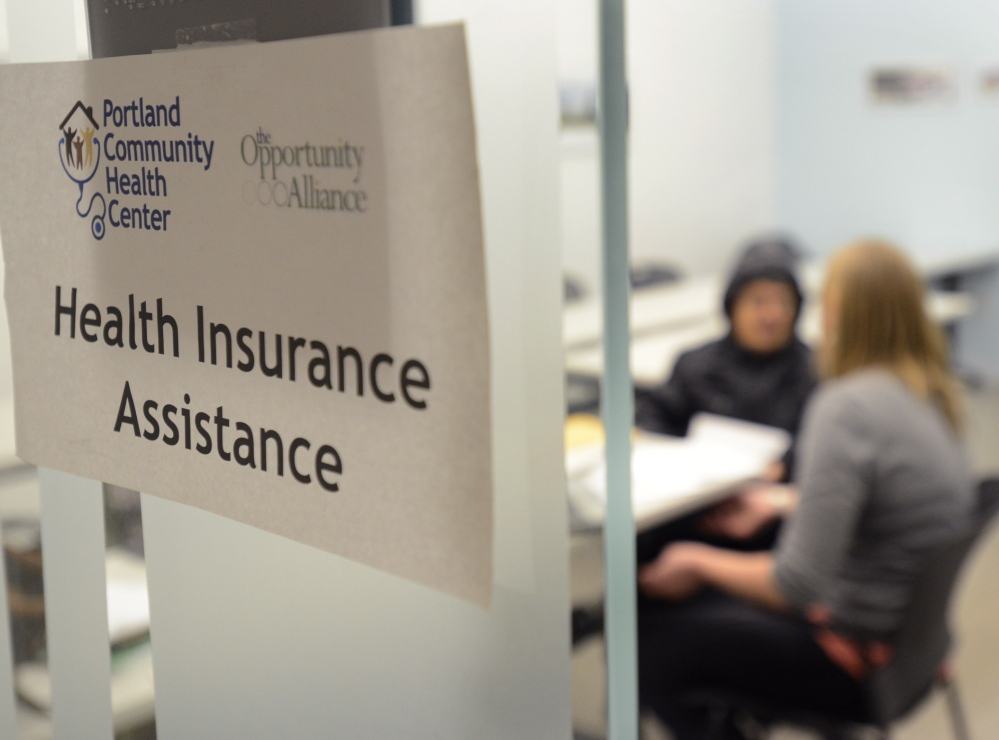Maine’s health insurance navigator organizations, which help people sign up for health care under the Affordable Care Act, have avoided the drastic cutbacks seen in other states for ACA outreach, and one group is even seeing an increase in funding.
Navigators connect with people most likely to need ACA insurance, also known as Obamacare, such as self-employed and part-time workers. They help people understand how insurance works, qualify for subsidies and make their choices among the maze of plans available for purchase.
Western Maine Community Action, which operates most of the navigator programs in Maine, is seeing its federal grant reduced from $521,000 per year to $452,000. The Maine Lobstermen’s Association, with a goal of signing up self-employed workers in the fishing industry, will get a boost in funding, from $79,000 to $100,000.
Ashley McCarthy, Western Maine’s navigator, said the nonprofit is relieved to receive about 86 percent of the funding that it was awarded in 2016. Agencies were bracing for a 40 percent reduction, and in some states, the cutbacks were even more drastic.
The Trump administration has also slashed its ACA advertising budget by 90 percent, from $100 million to $10 million.
“It’s not as bad as what we feared it would be,” said McCarthy, who found out the size of the funding cuts last week. “We’re still able to fund navigator programs. We’re just chugging along and trying to help as many people as we can.”
Western Maine funds 10 nonprofit agencies across the state, including Opportunity Alliance in Cumberland County, York County Community Action Agency and Midcoast Maine Community Action. McCarthy said it’s up to the agencies to determine how best to use the money for ACA outreach with a mix of full-time and part-time employees and volunteers helping people sign up for ACA insurance.
About 80,000 Mainers have health plans through the ACA, and most receive a subsidy to help them purchase insurance. About 20 million Americans have ACA insurance, either through Medicaid expansion or by purchasing individual plans in the health insurance marketplace. Western Maine’s navigators helped more than 2,000 sign up for ACA insurance last year.
The Centers for Medicare and Medicaid Services based its award on how closely navigators met enrollment goals in 2016.
“Navigator grantees will receive funding based on their ability to meet their enrollment goals during the previous year. For example, a grantee that achieved 100 percent of its enrollment goal for plan year 2017 will receive the same level of funding as last year, while a grantee that enrolled only 70 percent of its enrollment goal would receive 70 percent of its previous year funding level, a reduction of 30 percent. The new funding formula will ensure accountability within the navigator program,” according to a CMS news release.
The formula has triggered severe cutbacks in some states, with some navigators losing 50 to 90 percent of federal funding, including programs in Michigan, Nebraska, South Carolina, Georgia and Ohio, according to The Washington Post.
Nationally, the cuts were 40 percent, going from $63 million to $36 million. The Trump administration has argued that many of the navigators were not effective in signing up people, so that’s why it based grants on how close navigators came to reaching their 2016 enrollment goals. Critics have argued that the Trump administration is attempting to sabotage the ACA because President Trump wants to see the ACA repealed.
A last-ditch Republican effort to repeal and replace Obamacare that health analysts say would result in millions of people without health insurance is still pending in Congress.
While the law is still in place, open enrollment will last from Nov. 1 to Dec. 15, a shorter period than the first four years.
The Maine Lobstermen’s Association exceeded its goal of 260 sign-ups by enrolling 312 in 2016, according to the association, which is why it received extra funding.
“The MLA has an excellent track record in providing lobstermen and others throughout Maine in learning more about their health insurance options and assisting them in getting enrolled in ACA plans,” said MLA executive director Patrice McCarron in an email response to questions. “Our operations will not be impacted and we look forward to continuing to provide health insurance assistance to Maine lobstermen and our coastal communities.”
Also, the Maine Health Access Foundation, in response to the uncertainty in the future of the ACA, decided to spend $200,000 on “outreach and marketing” this year to help boost enrollment, after initially deciding to end its outreach efforts. The foundation had launched the enroll207.com website as a way to help people sign up.
“This will primarily be focused on social media, as well as likely on some transit advertising and radio, as well as bringing back the enroll207 website,” said Barbara Leonard, the foundation’s president and CEO.
Steve Butterfield, public policy director for Consumers for Affordable Health Care, a Maine-based health advocacy group, said even though Maine’s navigators will be OK this year for funding, the overall message of the Trump administration and the truncated enrollment period will curtail sign-ups.
“People think it’s closing down, and by the time they hear that it’s not, it may be too late to sign up,” Butterfield said. “We used to get a lot of enrollments in January, after the holiday season.”
Joe Lawlor can be contacted at 791-6376 or at:
jlawlor@pressherald.com
Twitter: joelawlorph
Send questions/comments to the editors.




Comments are no longer available on this story